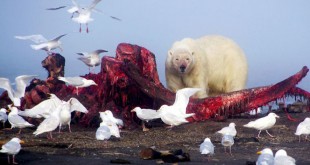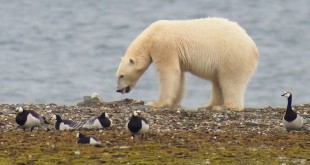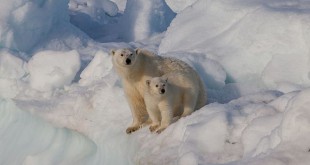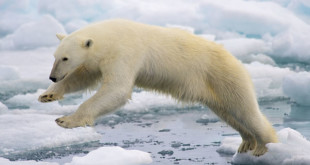Vanishing sea ice reduces the polar bears’ ability to hunt seals, which could result in more hungry animals.
Read More »The not-so-good news of polar bears consuming less mercury pollution
Scientists have found less mercury in the bodies of a group of bears they studied in recent years. The catch is, it’s likely because they’re having to find new sources of food as their normal hunting grounds — the ice of the southern Beaufort Sea — melt away. So they’re …
Read More »New study: Alaska polar bears working hard to keep up with drifting sea ice
A new study led by the U.S. Geological Survey and the University of Wyoming found that increased westward ice drift in the Beaufort and Chukchi seas requires polar bears to expend more energy walking eastward on a faster moving “treadmill” of sea ice….
Read More »Polar bears shift from seals to bird eggs as Arctic ice melts
Polar bears are ditching seafood in favour of scrambled eggs, as the heat rises in the Arctic melting the sea ice. A changing coastline has made it harder for the predators to catch the seals they favour and is pushing them towards poaching goose eggs…
Read More »Changing sea ice bad omen for province’s polar bears: professor
A leading expert in the field of polar bear research says it’s only a matter of time before Newfoundland and Labrador’s bear population begins to decline….
Read More »Human-driven global warming is biggest threat to polar bears, report says
Federal wildlife officials on Monday called climate change the biggest threat to the survival of the polar bear and warned that without decisive action to combat global warming, the bears would almost certainly disappear from much of the Arctic…
Read More »Pollutants in the Arctic environment are threatening polar bear health
A new analysis has found that although the risk of persistent organic pollutants (POPs) in the Arctic environment is low for seals, it is 2 orders of magnitude higher than the safety threshold for adult polar bears and even more (3 orders of magnitude above the threshold) for bear cubs …
Read More »Polar bear numbers could drop by a third in 40 years, research says
Polar bear numbers could drop by a third in the next 40 years because of melting Arctic sea ice, according to scientists. Experts have calculated there is a 71% likelihood that polar bear numbers will be reduced by more than 30% in three generations…
Read More »Decades-old chemicals may be threatening polar bear fertility
A new study sheds light on how today’s pollutants could become tomorrow’s threats to wildlife and humans. A between climate change, human conflict and habitat loss, polar bears have more than enough to worry about….
Read More »Sea ice loss is putting polar bears in a tough spot
For polar bears on the hunt for food, sea ice is a vital resource. Whether waiting for a seal to come up for air at a breathing hole, or snagging a seal hauled out on the ice before it slips back into the water, sea ice offers polar bears access …
Read More »Russian scientist shoots and kills polar bear in Norway
A Russian scientist has shot and killed a polar bear at Selvågen on the island of Prins Karls Forland in the Arctic archipelago of Svalbard. Svalbardposten reported that the course of events is unclear but that the bear was likely shot as it approached a tent camp belonging to a group …
Read More »Ice loss surpasses poaching as largest threat to Barents Sea polar bear
Prior to the 1970s, hunting decimated polar bear populations across the Arctic. The international community has made strides in protecting the iconic species from over-harvesting through conservation agreements, which have helped the species start to recover. However, a review paper published in Polar Research in July suggests that the road …
Read More » Ocean Sentry
Ocean Sentry










